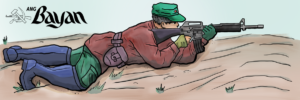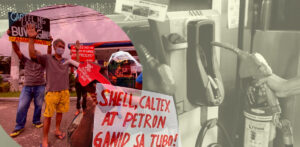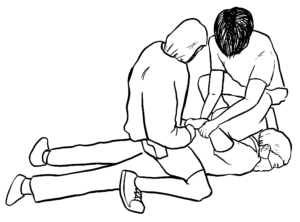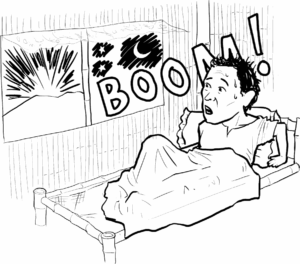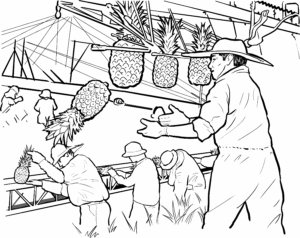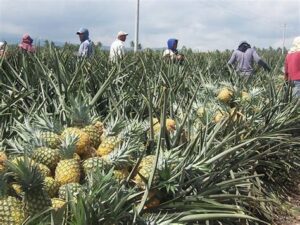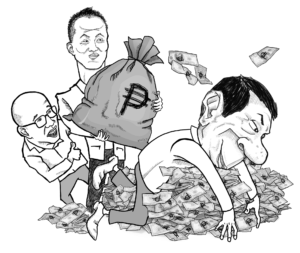Fertile conditions for people’s war

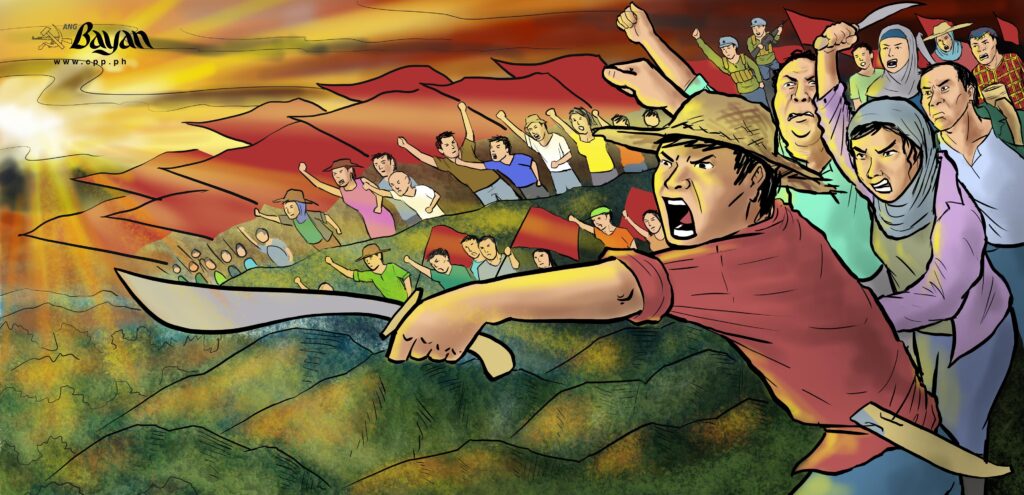
The Philippine countryside is engulfed in crisis. Millions of peasants, farmworkers and semiproletarians are beset by rising costs of production and prices of commodities, joblessness and lack of income worsened by oppressive pandemic policies, deleterious effects of calamities and fascist state violence. The social status of the rural pettybourgeoisie is also pulled down by the overall deterioration of living standards.
Attacks against the welfare and rights of the peasant masses have been relentless under the anti-peasant and anti-people US-Duterte regime. Duterte’s repeated boast of distributing land served only to obscure the various schemes of land grabbing. Contrary to land reform, widespread land-use conversion was implemented under Duterte who ordered policies to facilitate the interests of land grabbers.
This resulted in large numbers of peasants dislocated or denied of their rights to the land they are tilling to pave the way for infrastructure, energy and ecotourism projects, the entry of mining companies and expansion of plantations. This benefited foreign big capitalists in combination with big bourgeois compradors who are cronies or partners of Duterte. On the other hand, 1.1 million agricultural workers lost jobs in 2016-2018.
The suffering of the peasant masses have worsened under the all-out implementation of neoliberal policies, especially the removal of import restrictions on agricultural products. The implementation of the Rice Liberation Law—supposedly to bring down the retail price of rice—has resulted in grave losses for rice farmers as prices of their produce are pulled down by unequal competition from imported rice.
The liberalization policy also paved the way for large-scale smuggling that is killing local production and the livelihood of small peasants. Small vegetable farmers have expressed grievance over the dumping of foreign surplus agricultural products. This adds to their burden of rising costs of production leading to widespread bankruptcy of small vegetable farmers.
It is not a far possibility that all-out liberalization will kill the capacity of Philippine agriculture to supply local food needs, including palay. After decades of import liberalization, local production of garlic, onions and other products are on the throes of death, leading to increasing dependence on importation to supply the food requirements of Filipinos.
Aggravated by large-scale land use conversion and all-out import liberalization, the crisis of Philippine agricultural production is rooted in the prevalence of small-scale and backward system of production under the semicolonial and semifeudal system. The persistent dominance of monopolist landlords, who accumulate wealth mainly through land rent, is the overwhelming factor that prevents the progress of production. Due to the landlessness or extremely small parcel of land tilled by rent-paying peasants, there is no objective basis for mechanization and other improvements in the system of agricultural production.
Largely, large tracts of land of a few landlords continue to be tilled using draft animals and hand-implements. There is limited and sparse use of imported surplus harvesters and threshers machines. Irrigation facilities are limited and most of agricultural land are still dependent on rain. There is low level of mechanization even in capitalist plantations where a large part of production relies on manual labor. Raising production output is achieved not by improving the system of production, but through the expansion of plantation land.
The worsening crisis in the countryside primarily pounds the peasant masses and farmworkers, in the form of high land rent, skyrocketing costs of production, usurious debts, low prices of their produce, and low wages. There is a rising number of people who have lost all sources of income and are forced to migrate to seek work in the cities. They are dealt with death blows by disasters brought about by typhoons, drought, pests and other calamities.
The peasant masses undergo even worse suffering and brutality in areas placed under military control and rule. The Armed Forces of the Philippines (AFP) hamlet and fence off villages to control the movement of people in line with the maniacal policy of “removing the fish from the water” against the New People’s Army (NPA). Oppressive policies are imposed such as prohibiting peasants to go to their fields at restricting the purchase of food and commodities. They suffer from various forms of abuse such as armed intimidation, unlawful arrests, abductions, beatings, killings, bombings and shelling which aim to destroy their organizations and shatter their determination to defend their welfare and rights.
The NPA must further strive to arouse, organize and mobilize the peasant masses in the countryside. Antifeudal struggles must be thoroughly carried forward to lower land rent, eliminate usury, raise farm wages, for fair farmgate prices, against land grabbing in line with the struggle for genuine land reform. Alongside this, the struggles against terrorism perpetrated by the fascist military and police must be carried out with all-out energy.
Because they suffer from poverty, oppression and violence, the peasant masses are determined to march along the path of resistance. The countryside is ever more fertile ground for the NPA to strike deeper and wider roots for carrying forward the people’s war.

